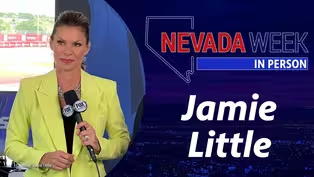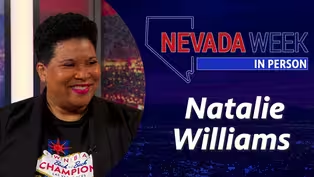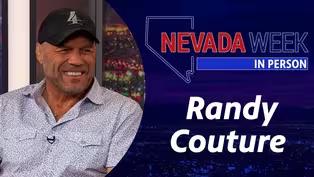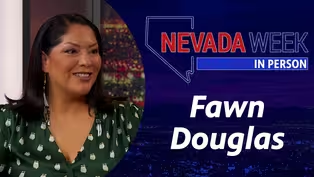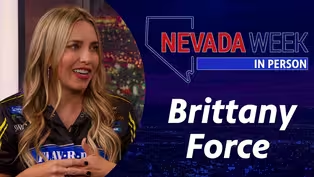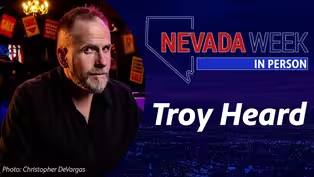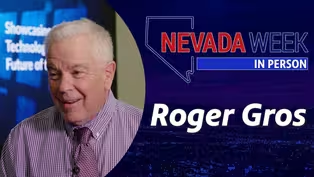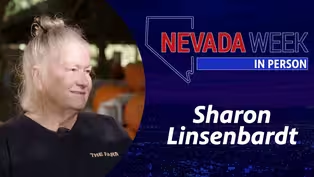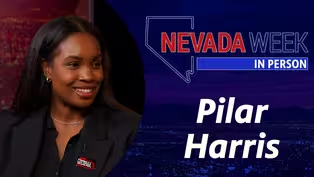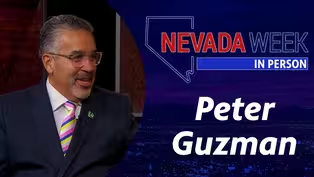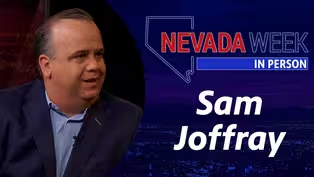
Nevada Week In Person | Spencer Haywood
Season 1 Episode 70 | 14mVideo has Closed Captions
One-on-one interview with Basketball Hall of Famer Spencer Haywood.
One-on-one interview with Basketball Hall of Famer Spencer Haywood.
Problems playing video? | Closed Captioning Feedback
Problems playing video? | Closed Captioning Feedback
Nevada Week In Person is a local public television program presented by Vegas PBS

Nevada Week In Person | Spencer Haywood
Season 1 Episode 70 | 14mVideo has Closed Captions
One-on-one interview with Basketball Hall of Famer Spencer Haywood.
Problems playing video? | Closed Captioning Feedback
How to Watch Nevada Week In Person
Nevada Week In Person is available to stream on pbs.org and the free PBS App, available on iPhone, Apple TV, Android TV, Android smartphones, Amazon Fire TV, Amazon Fire Tablet, Roku, Samsung Smart TV, and Vizio.
Providing Support for PBS.org
Learn Moreabout PBS online sponsorshipMore from This Collection
Nevada Week In Person goes beyond the roundtable discussion of Nevada Week with guests for a more casual conversation about their personal passions, new projects and compelling stories that are overlooked in the flurry of the news cycle.
Nevada Week In Person | Jamie Little
Video has Closed Captions
One-on-one interview with Jamie Little, NASCAR Broadcaster (14m)
Nevada Week In Person | Chet Buchanan
Video has Closed Captions
One-on-one interview with Chet Buchanan,Host & Creator, 98.5 KLUC’s The Chet Buchanan Show (14m)
Nevada Week In Person | Natalie Williams
Video has Closed Captions
One-on-one interview with Natalie Williams, General Manager, Las Vegas Aces (14m)
Nevada Week In Person | Randy Couture
Video has Closed Captions
One-on-one interview with Randy Couture, UFC Hall of Famer & U.S. Army Veteran (14m)
Nevada Week In Person | Fawn Douglas
Video has Closed Captions
One-on-one interview with Fawn Douglas, Artist and Activist, Nuwu Art (14m)
Nevada Week In Person | Brittany Force
Video has Closed Captions
One-on-one interview with Brittany Force, World Champion Drag Racer (14m)
Nevada Week In Person | Troy Heard
Video has Closed Captions
One-on-one interview with Troy Heard, Artistic Director, Majestic Repertory Theatre (14m)
Nevada Week In Person | Roger Gros
Video has Closed Captions
One-on-one interview with Roger Gros, Publisher, Global Gaming Business Magazine (14m)
Video has Closed Captions
One-on-one interview with Sharon Linsenbardt, Owner, Las Vegas Farm and Barn Buddies Rescu (14m)
Nevada Week In Person | Pilar Harris
Video has Closed Captions
One-on-one interview with Pilar Harris (14m)
Nevada Week In Person | Peter Guzman
Video has Closed Captions
One-on-one interview with Latin Chamber of Commerce Nevada President & CEO Peter Guzman (14m)
Nevada Week In Person | Sam Joffray
Video has Closed Captions
One-on-one interview with Sam Joffray, President & CEO, Las Vegas Super Bowl LVII Host Com (14m)
Providing Support for PBS.org
Learn Moreabout PBS online sponsorshipA pioneer in professional basketball, now health advocate right here in Las Vegas, Olympic Gold Medalist and Basketball Hall of Famer Spencer Haywood is our guest this week on Nevada Week In Person .
♪♪♪ Support for Nevada Week In Person is provided by Senator William H. Hernstadt.
Welcome to Nevada Week In Person .
I'm Amber Renee Dixon.
When the NBA said he couldn't play, he fought his case all the way to the Supreme Court and won.
Now because of Spencer Haywood versus the National Basketball Association, athletes can leave college early to play in the NBA or enter the league right out of high school.
Spencer Haywood, thank you for joining Nevada Week In Person .
(Spencer Haywood) Thank you.
Yes, it's been a long time.
-I know.
You mentioned to me off camera that I was your first interview in Las Vegas.
-That was my first interview in Las Vegas.
-I feel so honored.
-At USA Basketball.
-That's what we were there for.
And what were you doing there?
You were there to meet-- -I was there to meet the-- that particular team, which was Kobe Bryant, LeBron James, Chris Paul, and all of those guys.
And Jerry Colangelo, who was the head of USA Basketball.
And Mike Krzyzewski was the coach says, "Guys, I want you to meet Spencer Haywood."
And it was like, LeBron was like, What did he do this time that we're trying to do?
[laughter] -He says, "Well, no, he's the record holder for the most points and most rebounds for the Olympics."
He was like, Why this guy is everywhere we get ready to go, he has been there?
-You have been there.
-That's trailblazing.
-And you have paved the way for them.
-Yes.
-How so, beyond what I've mentioned in the intro, and what guys are able to play because of you, or started to play a lot earlier than they used to be able to?
-Years ago, you had to wait for four years after your high school class had graduated before you could enter into the pros.
I was in a situation where my mother was picking cotton for $2 a day in the South down in Mississippi in the Delta, and she could not survive another year.
So I decided that I had spent two years of college and went to the Olympics, had a gold medal, I needed to get my mother out of the cotton fields.
So I filed suit against the NBA for the rights to play.
And they filed suit against me for an injunction not to play.
And so the case kept maneuvering and maneuvering through, all the way to the Supreme Court where I won that case 7 to 2.
And it was, You won under the Sherman Antitrust Act, where Thurgood Marshall was one of the lead justices.
And he was speaking that, You cannot stop a person in America from making a living.
Even though the NCAA and the NBA had their collusion situation as well as the ABA, the American Basketball Association.
So I was fighting all three of them.
-Because you had played one season in the ABA.
-Yes.
-A spectacular season, winning Rookie of the Year and MVP, but you went to the NBA because you wanted to make some good money.
-I wanted to make some good money and because I had wiped out all of the records in the ABA.
This is a little shade I'm doing here.
[laughter] -So I wanted to play against Wilt Chamberlain, Jerry West, Oscar Robertson, and all of the greats.
So that was a little bit of a... -I'm going to make you list the greatest Lakers of all time in order coming up.
We gotta get to that, but first, back to your mother picking cotton.
You grew up picking cotton as well.
-Mm-hmm.
-You told me you think it allowed you to become a better basketball player.
How?
-Well, because what happened is your higher power, God, as we know it, put you in situations where you think is the worst, but it happens to be the best.
Now, I was a cotton picker, and I picked with both hands and I pulled a sack which weighed 100 pounds as a young man.
And so it developed my legs and it developed my hand and eye coordination and it developed discipline and endurance because I would work from sunup to sundown.
So whenever these, these obstacles are thrown in front of you, there's a door that's open so you can benefit from it.
So I benefit.
My hands were great in the NBA.
I had great hands.
I had soft hands.
You know, I could, I could play both sides with my left and right.
So there it is, from the cotton field.
-And what do you think made you the person, the right person to fight the NBA all the way to the Supreme Court?
-I don't know.
It was just-- again, you know, they are doing this movie of my life, and we are writing the script.
So they keep saying, Wait a minute.
How do you get to these places at this time?
And I don't know, but I do know that it was a spiritual force that brought me at that point in time.
I'm just a conduit for all of these things.
-The Supreme Court case that you won established the hardship clause.
So you had to prove that you were in need of money in order to play.
-I was in desperate need.
-But that hardship clause was removed, and it led the way for players like who to enter the NBA?
-Well, you have-- Let's go back to Julius Erving, George Gervin, Bob McAdoo, all of the players from the 70s, all the way up through to the 80s, Michael Jordan, Magic Johnson, Larry Bird.
Then you go into the 90s, you know, and the 2000s with LeBron James, Kobe, all of these players.
So if you look at the the actual numbers, in terms of what has it created in terms of revenue, it has created over $36 billion in player salary.
For the owners, it has created over $60 billion for the owners.
And it has opened up the NBA for European players to come in.
And if you noticed, our last three MVPs, or maybe four, the last four times we had an MVP, it's not from the United States.
So those players come in after one year of setting out as well, and they come into the league.
And Luka, Joker... -So prior to that ruling, they would have been able to play when?
-Four years later.
But usually what happened, guys would lose their perspective, things would happen.
So four years later is a lot of time from high schools to the pros.
And they didn't make it, so we couldn't grow the league.
We only had 16 teams.
And when I broke this rule, all of a sudden we grew, our franchises grew from 16 to 30.
So here I am in the middle of all of this stuff, this little kid that's picking cotton in Seville City.
How did it happen?
-Seville City, Mississippi.
-They used to say, There ain't no silver and it ain't no city.
[laughter] -Just cotton fields.
-It was that small.
-Yeah.
-Do you think you get enough credit for having accomplished that?
-No.
-Why not?
-Because, you know, when you fight against the system, they tag you as a revolutionary or someone else, and I was never that person.
And also because they wouldn't put my name on my ruling.
Even though it is from the Supreme Court, "Haywood versus the NBA," it has always been called "the hardship," "early entry," "one and done," "lost souls," whatever, but never the Spencer Haywood Rule.
And so that's why the movie is called The Spencer Haywood Rule .
-I'm glad you brought up that movie, because you have also been played recently in a drama series on HBO by actor Wood Harris.
-Yes.
-And in that, the cocaine addiction that you had at the time during the 1980s with that dynasty of the Lakers team, Magic Johnson-- -Kareem, Norm Nixon, Michael Cooper.
And I fell on my face.
But it taught me something, and it taught me how to get up, brush myself off, and survive.
This is 39 years of sobriety for me, and I've also helped with the NBA and all of its substance abuse programs, talking with players.
But that year was just a horrible year, and I-- -The year when they told you-- -The year 1980 when we were going to the championship.
And this movie that's on HBO right now-- What is it called, Showtime?
-Okay.
-Well, whatever it is.
-Okay.
Well, the one that we're talking about on HBO was Winning Time .
- Winning Time .
Yeah.
And so there was a lot of problems with, like Jerry West didn't like the way he was betrayed.
-Right.
-Magic didn't like the way he was betrayed.
But here I am saying, Hey, they told the truth on me.
[laughter] -So you were okay with it, because you told The Seattle Times that you had to have your psychologist on speed dial while watching it.
-Yes, I did.
-Why?
-Because it was bringing up a lot of things that I kind of pushed aside.
And so all of a sudden now it's right on the big screen, and Wood was playing me to the max.
And stuff that I, I was like, you know, I don't want to see this.
I don't want to see myself like this.
I don't want my kids to see me like that.
And then as I was talking, and she says, "Well, you know, that is part of your life.
That's part of your legacy.
That's part of who you are.
Think about the people that you are going to help by them watching this film."
So I was like, Okay.
-What would your advice be to people watching right now, battling addiction?
-Well, I mean, first and foremost, you're gonna have to admit that you have that problem or whatever the problem may be.
And you have to admit it, and then you have to seek help.
And there's help available now.
There's so much help out here, and it's not a stigma in terms of getting help.
Reach out, but you're going to have to have a spiritual base.
I don't know what your religion is or what it could be, but that is the base of all of it.
-What brought you to Las Vegas, and what is the health work that you are doing right now, the advocacy?
-Well, I came to Las Vegas, we came here to do the All-Star Weekend, And I was like, Whoa, this is a very nice place.
So I got involved in developing real estate here.
And I helped build the Smith Center, which is the Children's Museum.
I did all of the flooring there.
And I did the Army Reserve Center in Sloan.
I did all of the floor in there.
And as of lately, I want to build this retirement center in Las Vegas for the NBA and the WNBA players so that we will have a place when people do fall up on times.
And not necessarily fall up on bad times, but to have a place to come and sit and just relax and get rid of it.
Just like the Screen Actors Guild in Los Angeles.
-What would that look like, retired NBA players hanging out, rooming somewhere?
-Yeah, well, it's gonna look great, because we're going to have an NBA team here in two and a half years.
-Why do you say that?
-Because you have in the collective bargaining agreement, just reached by the NBA and the NBA Players Association, that there's going to be two expansion teams.
One is the Seattle, Seattle SuperSonics, and the other one is the Las Vegas-- who do we call them, the Rattlers or whatever?
-Well, you're breaking news, though, because that's not for sure for sure.
-Well, I know it's not for sure for sure, but then you got LeBron James who are like, lobbying for this particular location.
-Yeah.
-And you have the A's are moving in here.
You have the, the Raiders are here.
You have the Knights are here.
This is the city-- -And the Aces.
-And the Aces, the champions.
So this is the city of champions.
This is the city.
The new city for sports is Las Vegas.
Everybody want to be here.
-Okay.
30 seconds left.
Who are you picking to win the NBA Finals?
-The Lakers.
-Okay.
And your-- -Who do I care to finish second?
-Okay, well-- -Denver, of course.
-Top five Lakers of all time?
-I would say Kareem, LeBron, Kobe, Shaq, Wilt, and Jerry West.
-Spencer Haywood, thank you so much for joining Nevada Week In Person .
-Thank you.
-And to see more, go to vegaspbs.org/nevadaweek.
♪♪♪

- News and Public Affairs

Top journalists deliver compelling original analysis of the hour's headlines.

- News and Public Affairs

FRONTLINE is investigative journalism that questions, explains and changes our world.












Support for PBS provided by:
Nevada Week In Person is a local public television program presented by Vegas PBS
